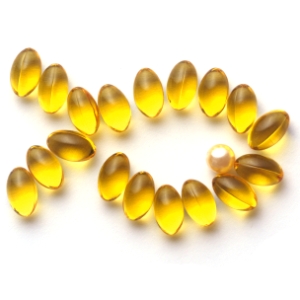
istock
People have been using fish oil supplements as a means to up their intake of omega-3 fats, as these fats are essential (can only be obtained from the diet), and are known to be beneficial for cardiovascular and overall health.
Findings show that omega-3 fats may help to:
Concerns
However, there are concerns regarding the safety of using omega-3 fish oil supplements in high doses. A recent study suggests a possible link between a greater risk of prostate cancer with higher intakes of omega-3 fatty acids, but further research is needed to confirm this relationship.
There is also the potential for high doses of omega-3s to prevent the blood from clotting, which could lead to bleeding, particularly in people with a bleeding disorder, or those who are using warfarin, aspirin or other anti-coagulants (anti-coagulants prevent the blood from clotting).
Omega-3 fish oil supplements can become quite costly, and there has also been concern regarding the quality of supplements that are available on the market.
Because of the uncertainty around the potential risks of using omega-3 fish oil supplements in high doses, supplements should be used with caution, and increasing your omega-3 intake from food is the better way to go.
Pilchards, sardines, salmon, tuna
Cold water oily fish are particularly good sources of the heart healthy omega-3 fats. Good examples include pilchards, sardines, salmon, mackerel, herring and snoek. Fresh tuna, trout, galjoen, kippers and anchovies also contain omega-3 fats.
Certain plant sources can also provide omega-3s, such as canola, soyabeans, walnut, flaxseed, linseed and their oils. However, the process of converting omega-3 fats from plant sources into compounds that the body can use is not very efficient. Omega-3 enriched eggs or breads may also be considered.
To ensure a good intake of omega-3s, healthy individuals should try to include a variety of fish at least twice a week as part of their diet.
People living with heart disease or those with a high risk of cardiovascular disease are encouraged to eat at least two portions (100g each) of oily fish per week.
If these individuals are unable to get sufficient omega-3 fats from their diet, they may consider fish oil supplements as another option (up to 3g/day is considered safe). However, this should only be done in consultation with a health care professional.
But for now, while the jury is still out around the safety of using omega-3 fish oil supplements, these may not be the best option for everyone. So why not save your money and rather enjoy tasty, healthy fish as part of a heart healthy diet.
SA Heart and Stroke Foundation
Findings show that omega-3 fats may help to:
- protect against heart disease, stroke and depression,
- reduce blood pressure and triglycerides,
- reduce the symptoms of rheumatoid arthritis,
- reduce the risk of abnormal heart rhythm,
- lessen the chance of sudden cardiac death in people with heart disease.
Concerns
However, there are concerns regarding the safety of using omega-3 fish oil supplements in high doses. A recent study suggests a possible link between a greater risk of prostate cancer with higher intakes of omega-3 fatty acids, but further research is needed to confirm this relationship.
There is also the potential for high doses of omega-3s to prevent the blood from clotting, which could lead to bleeding, particularly in people with a bleeding disorder, or those who are using warfarin, aspirin or other anti-coagulants (anti-coagulants prevent the blood from clotting).
Omega-3 fish oil supplements can become quite costly, and there has also been concern regarding the quality of supplements that are available on the market.
Because of the uncertainty around the potential risks of using omega-3 fish oil supplements in high doses, supplements should be used with caution, and increasing your omega-3 intake from food is the better way to go.
Pilchards, sardines, salmon, tuna
Cold water oily fish are particularly good sources of the heart healthy omega-3 fats. Good examples include pilchards, sardines, salmon, mackerel, herring and snoek. Fresh tuna, trout, galjoen, kippers and anchovies also contain omega-3 fats.
Certain plant sources can also provide omega-3s, such as canola, soyabeans, walnut, flaxseed, linseed and their oils. However, the process of converting omega-3 fats from plant sources into compounds that the body can use is not very efficient. Omega-3 enriched eggs or breads may also be considered.
To ensure a good intake of omega-3s, healthy individuals should try to include a variety of fish at least twice a week as part of their diet.
People living with heart disease or those with a high risk of cardiovascular disease are encouraged to eat at least two portions (100g each) of oily fish per week.
If these individuals are unable to get sufficient omega-3 fats from their diet, they may consider fish oil supplements as another option (up to 3g/day is considered safe). However, this should only be done in consultation with a health care professional.
But for now, while the jury is still out around the safety of using omega-3 fish oil supplements, these may not be the best option for everyone. So why not save your money and rather enjoy tasty, healthy fish as part of a heart healthy diet.
SA Heart and Stroke Foundation




 Publications
Publications
 Partners
Partners













